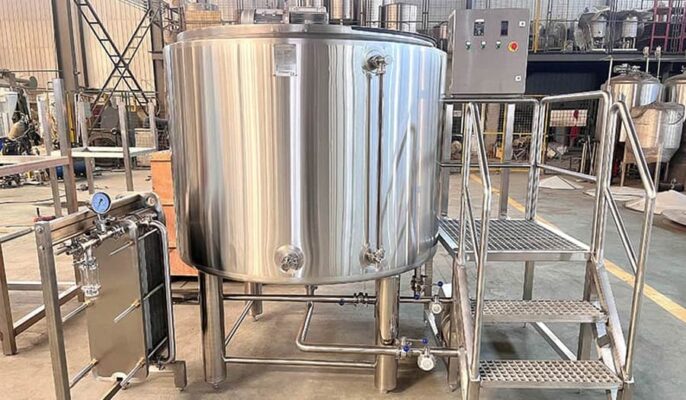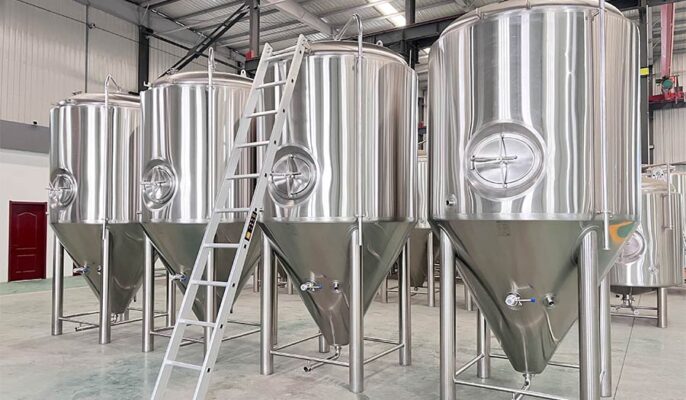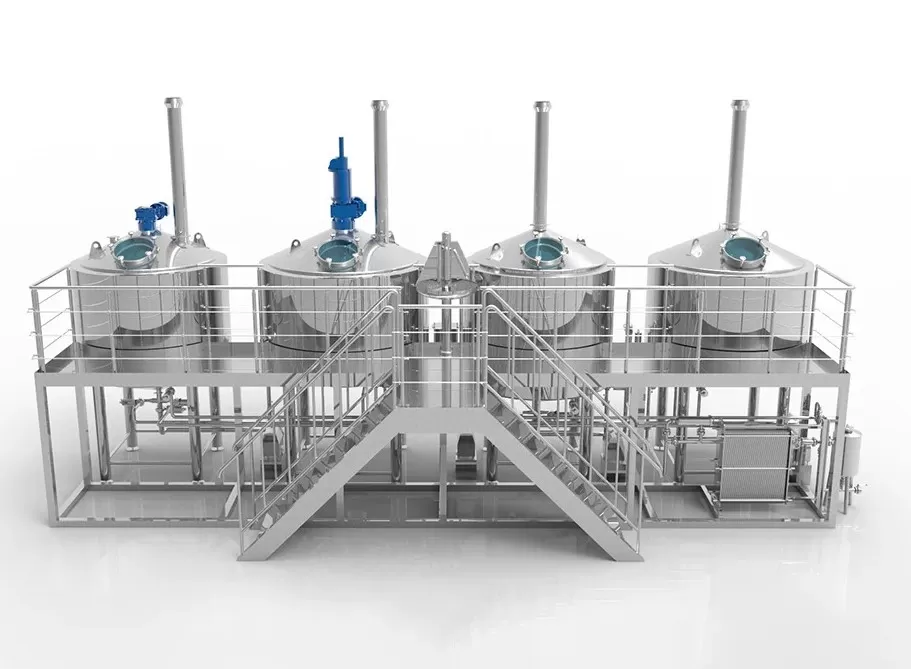A kombucha brewery typically requires a range of equipment to produce and package high-quality and consistent kombucha. A complete industrial kombucha brewing system typically includes a variety of equipment to facilitate an efficient and large-scale brewing process. If you are looking for kombucha brewing equipment, Micet Group can offer you some advice.
コンブチャとは?
Kombucha is a fermented tea drink, the basic ingredients of kombucha are yeast, sugar, and black tea. The mixture is left to sit for a week or more. During this time, bacteria and acids are formed in the drink, along with a small amount of alcohol. This process is called fermentation.
When fermentation is complete, kombucha is made, including vinegar, B vitamins, and many other types of acids, such as amino acids.
During the fermentation of kombucha, the bacteria and acids form a film at the top of the liquid called a SCOBY (Symbiotic Colony of Bacteria and Yeast).
Kombucha Brewing Process
- Making SCOBY (1 to 4 weeks) – Making the “Mother Bacteria”
- First Fermentation (6 to 10 days) – making real kombucha tea
- During the first fermentation, the yeast converts the sugar into alcohol and the bacteria convert the alcohol into acids.
- Second fermentation (3 to 10 days) – carbonates the kombucha tea

Selection of materials for Kampo tea
ガラス
Glass is the best choice for brewing kombucha. Not only will it not react with the acidity of the beer, but it is also less likely to scratch or contain chemicals such as BPA. You’ll need a minimum of 1.5 liters, but 2 liters or larger is better. For continuous brewing systems, larger glass jugs with taps are required. Make sure the faucet in the pot is plastic and not metal, as metal can damage kombucha. However, you need to make sure that the glass is safe and will not break.
プラスチック
Plastic is cheap and easy to make, but be careful when using it. Due to the acidic nature of kombucha, only certain types of plastic are suitable for brewing kombucha. Plastic is usually cheaper than glass, but you need to make sure it won’t scratch or break, and sometimes plastic is not as strong as glass.
ステンレス鋼
Stainless steel is the material used in the fermentation of beer, wine, kombucha, and spirits. Stainless steel is the material of choice for many commercial breweries and professional home breweries because it is durable, scratch and stain-resistant, and has excellent temperature control. However, stainless steel fermenters tend to be more expensive than other options.
Materials to avoid
Avoid crystal/stained glass, poor-quality stainless steel, brass, aluminum, cast iron, consumer-grade plastics, rubber, and any materials not listed in the “Approvals” section above. These are not suitable for kombucha production.
What equipment is needed to brew kombucha?
A kombucha brewery typically requires a range of equipment to produce and package high-quality and consistent kombucha.
Some of the equipment that is necessary for a kombucha brewery includes:
- Brewing Kettle: a brewing kettle is essential for brewing sweet tea, the primary ingredient in kombucha. It allows the brewer to control the temperature, time, and composition of the sweet tea to produce a consistent, high-quality kombucha.
- Fermenter: A fermenter is a large container, usually made of stainless steel, used for fermenting kombucha. Fermenters should be equipped with temperature control, agitation, and airflow systems to maintain optimal conditions for kombucha cultivation and prevent contamination.
- Refrigeration Equipment: Refrigeration equipment is used to cool and store kombucha before and after packaging. Refrigeration equipment should be able to maintain the required temperature and humidity and prevent kombucha from spoiling and deteriorating.
- Cleaning and Sterilizing Equipment: Cleaning and sterilizing equipment is used to clean and sanitize fermenters, filtering and bottling equipment, and other surfaces and utensils to prevent contamination and spoilage. Cleaning and sterilizing equipment should be able to remove dirt and debris and kill bacteria and other microorganisms without damaging the equipment or the kombucha.
- Bright tank: Typically made of stainless steel with lids, pressure gauges, temperature sensors, carbonation stones, and multiple valves, kombucha open fire tanks are hermetically sealed pressurized tanks used to control the temperature and carbonation of the kombucha and to allow for the development and blending of flavors and aromas. The kombucha open fire tank is an important piece of equipment in the production of kombucha because it allows the brewer to control the quality and consistency of the kombucha.
- Water treatment equipment: Water treatment equipment is used to purify, filter, and sterilize the water used to brew kombucha. Water treatment equipment should be able to remove impurities, bacteria, and other contaminants and ensure that the water is safe and of high quality.
- Heating and Cooling Equipment: Heating and cooling equipment is used to generate heat, steam, and cooling for the kombucha brewery. The equipment should be able to generate the required heating and cooling needs efficiently and sustainably, and reduce dependence on the grid and environmental impact.
- Filtration and Bottling Equipment: Filtration and bottling equipment are used to remove particles and sediments from kombucha and transfer them to bottles or other containers. Filtration and bottling equipment should be able to handle the flow and pressure of kombucha and prevent spillage, leakage, and waste.
- Labeling and packaging equipment: Labeling and packaging equipment are used to apply labels and seals to bottles or other containers and to package them in cartons or other materials. Labeling and packaging equipment should be able to apply labels and packages accurately and efficiently and ensure that they are properly attached and sealed.

Kombucha tea main ingredients
炭酸
One of the reasons why kombucha is so good is that it produces air bubbles, thanks to carbonation. The bubbles in kombucha are the result of the live bacteria used to make it. When sugar is added to a drink, the bacteria eat it (because sugar is delicious, and who wouldn’t want to eat it). This causes a chemical reaction that produces carbon dioxide, which creates carbonation.
発酵
Kombucha is just one of the many fermented food and beverage products we consume today: think yogurt, sauerkraut, kimchi, and other gut-friendly foods. “Kombucha is a sweetened tea that is fermented by a group of organisms into a deliciously sour tonic beverage that sometimes rivals apple sodas,” writes Sandor Elixir Katz in his book The Art of Fermentation.
スコビー
SCOBY stands for “Symbiotic Culture of Bacteria and Yeast” and is an essential ingredient in the fermentation process of kombucha.SCOBY is the key ingredient, but it’s not cute. Imagine a rubbery, flat disk, that’s SCOBY. That’s SCOBY. it’s dense and opaque, and it smells like vinegar. Even kombucha enthusiasts can be a little turned off by SCOBY, but it’s all part of the fermentation process.
コンブチャ器具の選び方は?
When choosing 昆布茶醸造装置, it is important to choose a container that is food-safe, easy to clean, and large enough to hold the amount you want to brew.
- Size: Choose a brewing container that can hold the batches of kombucha you want. Think about how much kombucha you will be brewing at a time and choose your container. It is important to have enough space for the SCOBY and the liquid to ferment.
- Material: Choose a brewing container made of glass or ceramic. These materials are ideal because they are non-reactive and will not interact with the acidity of kombucha. Avoid containers made of plastic or metal because they can leach chemicals into the brew, affecting the taste and quality of your kombucha.
- Quality: Invest in high-quality equipment that meets food safety standards and is designed specifically for brewing kombucha. Look for containers and lids that are durable and can withstand the fermentation process. Quality equipment will last longer and provide a better brewing experience.
- Convenience: Consider whether the equipment is easy to clean, assemble, and use. Brewing kombucha requires regular maintenance and cleaning, so choose equipment that is easy to clean and sterilize. Look for lids that fit well and are easy to remove and replace. Easy-to-use equipment will make the brewing process more enjoyable.
- Economic benefits: Consider the price of the equipment and the cost of use to ensure that the selected equipment is economically feasible and can be paid back within a reasonable time.
- After-sales service: Choose a supplier with good after-sales service to ensure the normal operation of the equipment and timely maintenance and support when needed.




